
This is a prompt that serves as a socratic tutor for students.
- Subject:
- Agriculture & Natural Science
- Arts and Humanities
- History
- Material Type:
- Homework/Assignment
- Author:
- Lane Freeman
- Date Added:
- 12/15/2023

This is a prompt that serves as a socratic tutor for students.
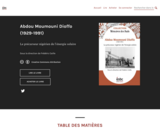
Ce livre est un hommage à son travail dont la portée et le caractère précurseur nous sont plus sensibles que jamais, près d’un demi-siècle après la publication de ses articles majeurs. Puissent les jeunes d’Afrique et d’ailleurs être nombreux à suivre son exemple! À noter que les textes présentés ici (à l’exception de l’article de 1969 sur « La conférence de Nairobi » et du cahier photographique) sont aussi publiés dans l’ouvrage que j’ai co-dirigé avec Mamadou Badji Du soleil pour tous. L’énergie solaire au Sénégal : un droit, des droits, une histoire (2018, Éditions science et bien commun).
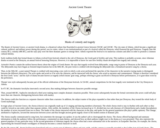
Greek Theater

A Virtual tour of the Roman Forum.
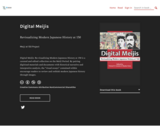
The 2017-2018 academic year saw the 150th anniversary of Japan’s 1868 Meiji Restoration, an epochal political revolution that sparked Japan’s remarkable modernization, dramatic cultural transformation, and rapid emergence onto the global stage. To mark this historic date, colleagues across the University of British Columbia in the Centre for Japanese Research, the Department of History, the Department of Asian Studies, the Asian Library, and the Museum of Anthropology partnered to present the UBC Meiji at 150 Project. Over the course of the year, the Meiji at 150 project convened over 60 scholars of Japanese studies from around North America, Japan, and Europe to situate Japan in global history and to interrogate the place of the Meiji Restoration in Japanese history, historical pedagogy, and cultural studies. All told, the Meiji at 150 Project reached thousands of individuals around the globe through its various events and initiatives, centering the study of Japanese history in the UBC university community and solidifying UBC’s position as the premier institution for Japanese studies outside of Japan.

A collection of sources on Southern history, literature, and culture.
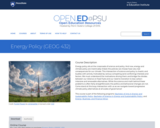
Energy policy sits at the crossroads of science and policy. And now, energy and climate policy are inextricably linked; the policies we choose have very real consequences for our climate. This intersection of science and policy is chaotic and bustles with activity motivated by various competing (and conflicting) interests and factors. We must understand the motivations driving them and bridge the divides between our reliance on fossil fuels and our need to transition to less carbon-intensive and renewable alternatives. While the science and math behind these problems is often fairly straightforward, the politics and behavioral changes are not. Come stand at this busy intersection with us as we navigate toward progressive climate policy alternatives at all scales of governance!
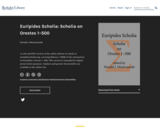
Scholia are the annotations found in medieval manuscripts of Greek authors. They are found in the margins and between the lines of a primary text, or occasionally gathered in a separate codex or section of a codex. The annotations represent an amalgamation of commentary and glosses made over a long period of time, from the 2nd century BCE to the Renaissance.

Professor James Stacey Taylor of the College of New Jersey discusses the contributions of philosopher and economist Adam Smith to the Scottish Enlightenment. Smith is best remembered as the father of modern economics, but he also made important contributions to philosophy in his book "The Theory of Moral Sentiments".

Professor James Stacey Taylor of the College of New Jersey discusses the contributions of philosopher, historian, and economist David Hume to the Scottish Enlightenment, with a particular focus on sentimentalist philosophy.

Professor James Stacey Taylor of the College of New Jersey discusses the contributions of philosopher Francis Hutcheson to the Scottish Enlightenment, especially his contributions to the sentimentalist approach to morality.
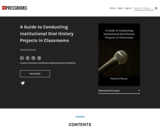
This guide outlines how to conduct an online oral history project with an institutional focus in a classroom. Conducting an oral history project enables students to engage in a real history research project that improves their research, writing, communication, and listening comprehension skills and abilities. The students will be able to better understand the past and recognize that examining the past events is not always straightforward, and each story provides an intimate portrait of the past that is unlikely to be revealed otherwise. This guide can be used in a public history course as a final term project to be completed over the course of the semester.
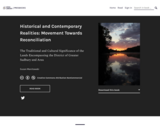
The idea behind the creation of this open textbook is twofold. First, it is written as a resource for educators to teach students about the Indigenous historical significance of the lands encompassing the Robinson-Huron Treaty area and more specifically the Greater Sudbury and Manitoulin area. Secondly, through the use of interactive mapping strategies, the textbook will serve as a guide for educators to develop a similar resource to document Indigenous stories from their own areas.

History Matters-- A resource guide for history teachers.

Today people often believe that classical liberalism is all about free market economics, but according to Dr. Stephen Davies of the Institute of Economic Affairs, this definition misses the mark. In this lecture, Dr. Davies explains three key insights from classical liberalism and how the ideology has influenced how we approach subjects like history, economics, and even psychology.

Women's history resources and links.
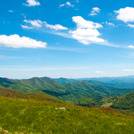
overview goes here

The purpose of this course is to explore the foundations of the Humanities and to increase our understanding of the relationship between history and philosophy and how these relate to the issues concerning the human condition. During this course we will learn about some of the many traditions in the humanities, including the foundations of artistic expression. One of my main goals for this course is to demonstrate that every aspect of the humanities (art, history, philosophy, science, etc.) are all inherently related, and that we cannot accurately study one component of society or humanity without having a working understanding of the related components.

Content By the end of this course, you will be able to: Identify the major political, economic, and social developments in Pacific Northwest history and especially in the state of Washington., Integrate the perspectives of different peoples to interpret Pacific Northwest history., Describe the Pacific Northwest?s role in the context of American and world history. , Apply your knowledge of Pacific Northwest history to your life by conducting an oral history and by researching and writing about issues in the region today. , Define current environmental issues in the Pacific Northwest and analyze their historical context.

History 116, the first part of the introductory surveys of Western Civilization. This course covers the period from early civilized man to the early Middle Ages of Europe, with emphasis on Greece, Rome, Egypt and other Mediterranean peoples.